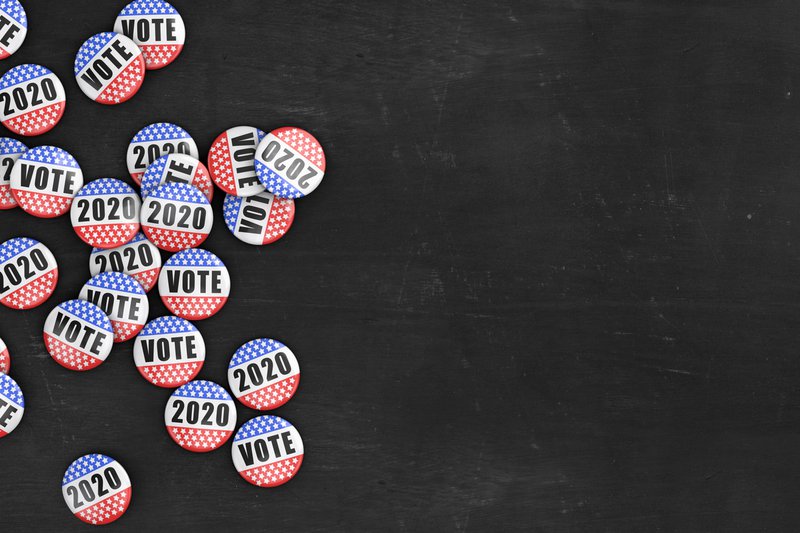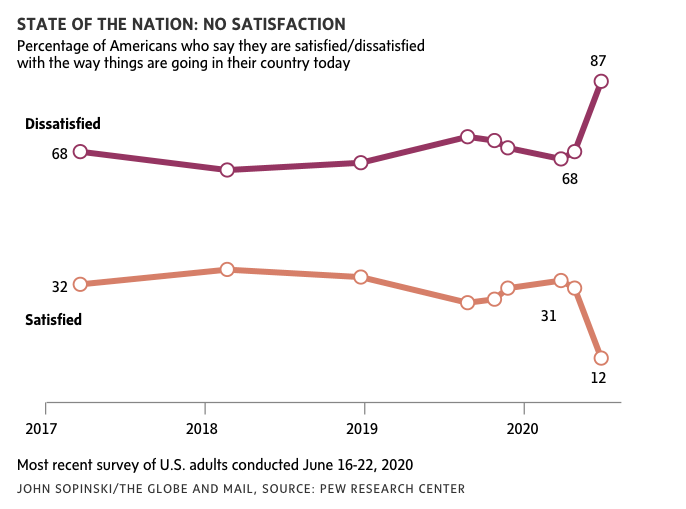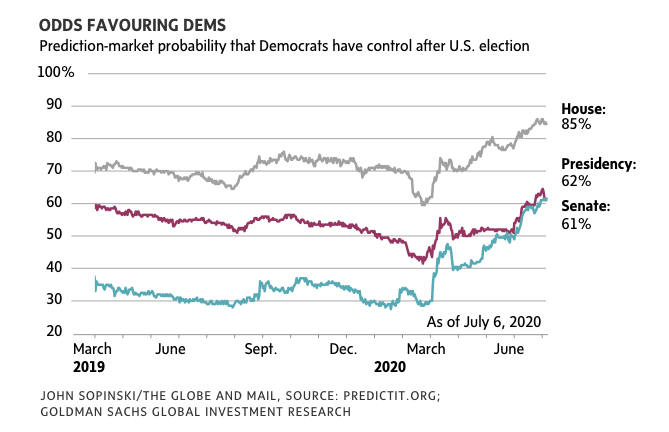
Ian McGugan
July 11, 2020
It is Nov. 4, a day after the U.S. presidential election, and Joe Biden has just won a narrow victory. Or has he?
Donald Trump alleges fake mail-in ballots cheated him out of a win. Republican-controlled legislatures in Michigan, Wisconsin and Pennsylvania refuse to accept the election-night counts in their states. The Republican Party files suit to prevent certification of the election results.
The U.S. Supreme Court tries to remain aloof and avoid having to decide yet another presidential election, as it did in 2000 following disputed vote results in Florida. However, massive street protests finally convince the court it must act. As the justices ponder, government grinds to a halt. Armed militias prowl Washington.

This ugly scenario was one of several explored in a recent “war games” organized by the Transition Integrity Project, a non-partisan group created by Rosa Brooks of Georgetown University Law Center and Nils Gilman of the Berggruen Institute, a Los Angeles-based think tank.
The participants in the war games included Democratic and Republican political operatives, as well as constitutional lawyers and journalists. Each was assigned to play a role. Some represented the Biden campaign, others the Trump campaign. Still others took the places of elected officials, courts and other key players.
Their job was to explore how each of these key groups might plausibly act in four scenarios – a too-close-to-call outcome on election night, a Biden landslide, a narrow Biden victory, or a situation where Mr. Trump wins the Electoral College but loses the popular vote by an even wider margin than in 2016.

The disturbing conclusion? In three out of the four scenarios, the U.S. winds up in a political crisis. The only stable scenario is one where one of the candidates wins a victory strong enough to sweep away all doubts.
Investors may want to start praying for such a landslide outcome. A swift, indisputable victory by either side would provide at least one point of certainty in an economic environment full of unknowns.
Among the many questions for Canadian investors and companies is how Mr. Trump or Mr. Biden will address the huge deficits and high unemployment created by the pandemic.
Mr. Biden has indicated he would raise taxes on corporations and high earners, a move that might help reduce inequality. However, it could also hobble U.S. stocks. The immediate effect of the tax hikes would be to reduce 2021 earnings estimates for the S&P 500 by roughly US$20 a share, from US$170 to US$150, according to Goldman Sachs analysts.
More broadly, his plans would reverse more than half the US$2-trillion in corporate tax cuts pushed through by the Trump administration, according to an analysis by the Tax Foundation. But that doesn’t necessarily mean lower deficits. Mr. Biden’s economic advisers include Stephanie Kelton, a prominent advocate of Modern Monetary Theory, which argues debt and deficits matter less than many mainstream economists think.

In determining how to spur a recovery, a Biden administration is likely to be just as nationalistic as the Trump administration. On Thursday, the presumptive Democratic nominee unveiled a proposal to spend US$700-billion on U.S.-made products and research. He also promised an end to loopholes that allow federal agencies and federal contractors to sidestep existing “Buy American” contracts.
At the very least, a Biden victory would squelch Alberta’s hopes for the beleaguered Keystone XL pipeline. The project, from Calgary-based TC Energy Corp., is designed to carry Alberta crude to U.S. refineries but has aroused opposition because of concerns it could worsen climate change. Mr. Biden has vowed to cancel the project’s permit if elected.
All of this suggests a Biden victory poses risks for Canada. On the other hand, a Trump victory creates threats of its own.
The President’s erratic trade policy frequently sideswiped Canada during his first term while his shambolic handling of the novel coronavirus crisis undermined confidence in the U.S. recovery. Even before the pandemic struck, his tax cuts had blasted a hole in the federal budget.
On the global stage, his increasingly tense confrontations with Beijing have helped to chill trade. Meanwhile, his disdain for international organizations has made it difficult for the West to form a united front on issues such as China’s increasing assertiveness, including its crackdown on dissent in Hong Kong.
For now, markets appear confident things will work out. Stock prices are rising even as prediction markets such as predictit.org indicate the Democrats are poised to sweep the election. Mr. Biden is expected to take the presidency while his party is also forecast to win control of both the Senate and the House of Representatives.
The caveat is that nothing is for sure in 2020. Back in February, when the U.S. economy was booming, Mr. Trump’s re-election seemed like a done deal. Then the pandemic, a crashing economy and George Floyd’s death turned expectations upside down.
More drama may lie ahead. Multiple polls show Mr. Biden holds a impressive lead in the presidential race. However, surveys also indicate he stirs little passion among voters. A mere 6 per cent of respondents to a Pew Research Center poll in mid-June thought he would make a great president.
Mr. Biden’s strength lies in his middle-of-the-road, steady-as-she-goes persona. When going up against the divisive Mr. Trump, his reputation for personal decency may be all that is required to attract many centrist voters. But he is vulnerable if Republicans hammer him on the points where he is weakest – like how his son Hunter has managed to cash in on the family name with lucrative corporate gigs.
More than anything else, voters seem angry and volatile. The number of voters who describe themselves as “dissatisfied” has soared this year, according to another Pew survey.
The possibility of a close election in this charged environment raises some interesting scenarios. Among them is the risk the election result could remain in limbo until December or even longer.
The increasing use of mail-in ballots could contribute to such delays. In 2016, 24 per cent of ballots cast in the presidential election were via mail. The figure will probably spike higher this time around as voters seek to avoid ballot lines because of infection fears.
“In a close election, it will take time to count – and invariably re-count – all the mail-in ballots,” Goldman Sachs analysts headed by strategist David Kostin wrote in a report this week. A surge in absentee voting could leave the results of the election in dispute for weeks, the analysts say.
Any uncertainty would play into the hands of Mr. Trump. Many observers doubt he would leave office on Jan. 20 without exploring all options for contesting a close result. He has already laid the foundation for a possible challenge by making unsubstantiated claims that the increasing use of mail-in ballots will lead to voter fraud.
“Trump got himself impeached by trying to blackmail a foreign country into helping his re-election campaign,” Washington Post columnist Max Boot wrote this week after participating in the Transition Integrity war game. “He will stop at nothing to avoid the stigma of being branded a ‘loser.’ ”
Investors should not underestimate the possibility of post-election pandemonium.
This Globe and Mail article was legally licensed by AdvisorStream.
© Copyright 2024 The Globe and Mail Inc. All rights reserved.


